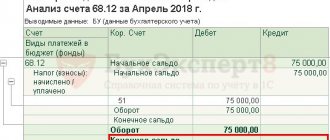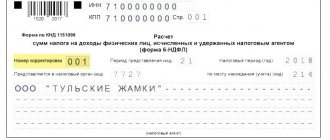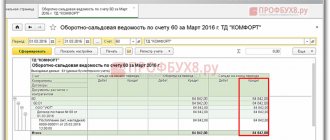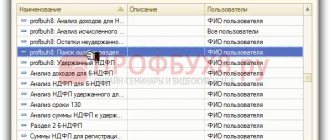Tax notice on advance payments
The tax notice must be sent to the entrepreneur no later than 30 working days before the payment deadline established by paragraph 9 of Article 227 of the Tax Code of the Russian Federation (paragraph 2, paragraph 2, article 52, paragraph 6, article 6.1 of the Tax Code of the Russian Federation). This rule also applies when the inspectorate recalculates the amount of advance payments based on the adjusted declaration. The notification form was approved by order of the Ministry of Taxes and Taxes of Russia dated July 27, 2004 No. SAE-3-04/440.
The notification must necessarily be accompanied by a sample payment document for the transfer of the advance payment - notification in form No. PD (tax) (clause 3 of the order of the Ministry of Taxes of Russia dated July 27, 2004 No. SAE-3-04/440). The notification form was put into effect by letter dated February 18, 2005, Federal Tax Service of Russia No. MM-6-10/143, Sberbank of Russia No. 07-125B.
A tax notice can be transmitted:
- personally to the entrepreneur or his representative;
- by registered mail. In this case, the notification is considered received after six working days from the date of its sending (clause 4 of article 52 of the Tax Code of the Russian Federation);
- in electronic form via telecommunication channels.
Situation: should an entrepreneur make advance payments for personal income tax if he has not received a tax notice?
No, you shouldn't.
Transfer of advance payments for personal income tax is made exclusively on the basis of tax notices (clause 9 of article 227 of the Tax Code of the Russian Federation). Until a tax notice is received from the inspectorate, the obligation to pay tax (advance payments) does not arise (clause 4 of article 57 of the Tax Code of the Russian Federation). Therefore, if an entrepreneur has not received a notification about the payment of advance payments for personal income tax, he may not transfer these amounts to the budget.
The validity of this conclusion is confirmed by arbitration practice (see, for example, the resolution of the Federal Arbitration Court of the Central District of July 3, 2006 No. A-62-834/2005).
Non-standard situations
The advance is paid on the last day of the month
An exception to the above rules is the situation when the advance is issued on the last day of the month, and the salary is issued in the middle of the next month. For example, an advance payment for May is paid on May 31, and a salary for May is paid on June 15. In this case, the date of actual receipt of income and the date of payment of the advance coincide. This means that already when issuing an advance, you can create a personal income tax base, calculate the amount of tax and transfer the money to the budget.
If, under such circumstances, the employer transfers tax when paying wages and not an advance, inspectors have the right to fine him on the basis of Article 123 of the Tax Code of the Russian Federation. This conclusion was made in the ruling of the Supreme Court of the Russian Federation dated May 11, 2016 No. 309-KG16-1804 (see “The court explained when to transfer personal income tax if the advance is paid to employees on the last day of the month”).
Thus, an employer who issues an advance on the last day of the month is obliged to pay personal income tax on the advance no later than the next day. Then, when the second part of the salary is paid, the organization or individual entrepreneur will transfer the remaining tax for the month worked.
Let us add that the described schedule for payment of advance payments and salaries is very inconvenient from a practical point of view. The fact is that HR officers often close the time sheet and transfer it to the accounting department not on the last day of the month, but after one or two days. And before receiving the report card, accountants cannot determine the amount of income, taxable base and tax. To prevent violations, employers need to either change the salary payment schedule or ensure “early” closure and transfer of timesheets.
Salary is paid in three installments
It happens that employers pay wages not two, but three times a month. As a rule, this happens due to the fact that at the time of payment of the second part of the salary, the company or individual entrepreneur does not have enough funds to fully pay the staff. A debt remains, which the employer repays as soon as possible.
The Federal Tax Service commented on this situation in a letter dated March 24, 2016 No. BS-4-11/4999. According to officials, when faced with it, an accountant should act as follows. If the advance is paid before the end of the month, then there is no need to transfer personal income tax when issuing it. But for each payment made after the end of the month, income tax must be paid (see “The Federal Tax Service announced when personal income tax should be transferred if the monthly salary is paid in three installments”).
Let's explain with an example. Let’s say the advance payment for May was issued on May 25, and the salary for May was issued on June 10 and June 15. Then the accountant must first calculate the total amount of personal income tax for May. Then (if paid on June 10) determine what share of the total amount of the “May” personal income tax falls on the amount of the advance and the first part of the salary. The resulting value is the tax that must be withheld on June 10 and transferred to the budget no later than June 11. The remaining share of the total amount of the “May” personal income tax must be withheld on June 15 and transferred to the budget no later than June 16.
A bonus for labor achievements is issued along with an advance payment
Another exception to the general rules, according to officials, is the situation when, along with the advance payment, the employer pays a bonus for production achievements. The Russian Ministry of Finance is convinced that personal income tax on bonuses must be withheld at the time of their actual payment. And even if the bonus is issued before the end of the month, the tax must be withheld and transferred to the budget no later than the next day.
Financial department specialists explain their position as follows. The general algorithm for withholding and transferring personal income tax from advance payments and salaries applies only to income in the form of wages. But the bonus for labor success is not remuneration, but an incentive payment. Therefore, the date of actual receipt of income for a bonus is not the last day of the month, but the day of payment (subclause 1, clause 1, article 223 of the Tax Code of the Russian Federation). As a result, the taxable base must be formed and the tax withheld at the moment when the bonus is issued to the employee. This point of view was expressed by the Russian Ministry of Finance in a letter dated November 12, 2007 No. 03-04-06-01/383 and confirmed in a letter dated March 27, 2015 No. 03-04-07/17028 (see “Ministry of Finance: Personal income tax on bonuses must be withheld the day of its payment").
However, the judges have a different opinion. In arbitration practice, there are examples where an employer managed to defend its right to transfer personal income tax from a bonus when paying a salary, not an advance. The court recognized: a bonus for production achievements is an element of remuneration, since it was received within the framework of labor relations. If so, then the date of actual receipt of income for the bonus is the last day of the month. Before this date, there is no need to accrue and withhold personal income tax (resolution of the North-Western District Court of December 23, 2014 No. A56-74147/201; “The court resolved the dispute about the date of payment of personal income tax on bonuses for production results”). However, if a company or individual entrepreneur seeks to avoid disagreements with inspectors and possible litigation, it is easier to withhold and pay personal income tax when issuing a bonus.
The procedure for paying personal income tax based on the results of the tax period
Based on the results of the tax period, transfer to the budget the difference between the amount of tax on income received for the year, the amount of advance payments transferred during the year and the amount of tax withheld by tax agents on income from activities not related to business (clause 3 of Article 227 of the Tax Code of the Russian Federation ). Determine this difference using the formula:
| Amount of personal income tax to be paid at the end of the tax period | = | The amount of personal income tax from the entire tax base generated for the year | – | The amount of advance payments for personal income tax transferred to the budget during the year | – | The amount of personal income tax withheld from income received by tax agents |
The basis for calculating the tax is a declaration in form 3-NDFL, which entrepreneurs are required to draw up and submit to the tax office no later than April 30 of the year following the reporting year (clause 1 of Article 229 of the Tax Code of the Russian Federation).
Personal income tax must be transferred to the budget at the place of tax registration of the entrepreneur no later than July 15 of the year following the reporting year (clause 6 of Article 227 of the Tax Code of the Russian Federation).
Attention: if the tax (including advance payments) was transferred later than the established deadlines, the tax office may charge the entrepreneur a penalty (Article 75 of the Tax Code of the Russian Federation).
Penalties will be calculated as follows:
| Penalty | = | Unpaid (late) amount of tax (advance payment) | × | Number of calendar days of delay | × | 1/300 of the refinancing rate in effect during the period of delay |
Penalties will be charged for each day of late payment, including weekends and non-working holidays. The number of days of delay will be counted from the next day after the established deadline for transferring the tax until the day of its payment (offset, etc.). For the day on which the tax payment obligation was fulfilled, no penalties are accrued. This is due to the fact that they are charged on the amount of debt to the budget resulting from late payment. On the day of presentation of the payment document to the bank (offset, etc.), the tax debt is considered repaid (clause 3 of Article 45 of the Tax Code of the Russian Federation). That is, the base for calculating penalties on this day is zero. Consequently, there are no grounds for accruing penalties for this day.
This procedure follows from the provisions of paragraphs 3 and 4 of Article 75 of the Tax Code of the Russian Federation and Section VII of the Requirements, approved by Order of the Federal Tax Service of Russia dated January 18, 2012 No. YAK-7-1/9.
Penalties are not charged if the cause of the arrears was:
- decision of the inspectorate to seize the property of an entrepreneur;
- a court decision to take interim measures in the form of suspension of transactions on the entrepreneur’s accounts, seizure of the entrepreneur’s funds or property.
In these cases, penalties are not accrued for the entire period of validity of these decisions.
This is stated in paragraph 2 of paragraph 3 of Article 75 of the Tax Code of the Russian Federation.
In addition, penalties are not charged if the tax arrears arose due to the fact that, when calculating taxes, the entrepreneur was guided by written explanations of the regulatory authorities (clause 8 of Article 75 of the Tax Code of the Russian Federation).
The salary advance exceeded the amount of income accrued to the employee
According to the situation described, the wage advance exceeded the amount of income accrued to the employee.
In this case, given that the advance was paid in an amount greater than the employee’s actual time worked, the advance paid should be offset against wages at the end of the month. The date of actual receipt of income in the form of wages for tax purposes is defined as the last day of the month for which the taxpayer was accrued income (clause 2 of Article 223 of the Tax Code of the Russian Federation). Since the advance payment is offset against accrued wages at the end of the month, the date of receipt of the specified income is considered to be the last day of the month. In turn, the object of personal income tax is the income received by the taxpayer (Article 209 of the Tax Code of the Russian Federation). Thus, personal income tax must be calculated on the advance amount on the last day of the month. According to paragraph 6 of Art. 226 of the Tax Code of the Russian Federation, the withheld personal income tax must be transferred to the budget no later than the date following the day of payment of income. In our case, this day is the last day of the month when the advance was counted towards wages.
Since the calculated amount of tax must be withheld directly from the employee’s income upon actual payment, during subsequent settlements with the employee, the calculated amount of personal income tax (clause 4 of Article 226 of the Tax Code of the Russian Federation) and the amount of the unearned advance issued on account of wages are withheld from his earnings ( Article 137 of the Labor Code of the Russian Federation).
Credit or refund of overpayment
The amount of actually transferred advance payments may be greater than the amount of personal income tax accrued at the end of the year. In this case, the entrepreneur has an overpayment, which can be offset or returned from the budget in the manner prescribed by Article 78 of the Tax Code of the Russian Federation.
An example of calculating personal income tax payable at the end of the tax period
At the end of 2015, entrepreneur A.A. Ivanov calculated the amount of personal income tax payable to the budget, which amounted to 70,000 rubles.
In payment of personal income tax for 2015, on the basis of a tax notice, Ivanov transferred advance payments for personal income tax in the following amounts:
- July 13, 2015 – 20,000 rubles;
- October 12, 2015 – 10,000 rubles;
- January 14, 2015 – 10,000 rubles.
The total amount of transferred advance payments amounted to 40,000 rubles. Thus, at the end of 2015, Ivanov must pay to the budget the difference between the amount of tax calculated for the year and the total amount of advance payments transferred: 70,000 rubles. – 40,000 rub. = 30,000 rub.
On July 10, 2021, Ivanov drew up a payment order to transfer this amount to the budget.







